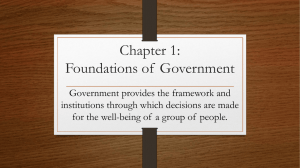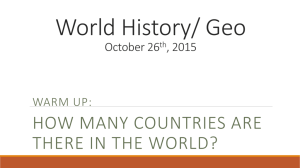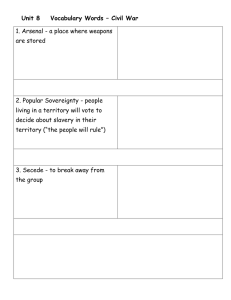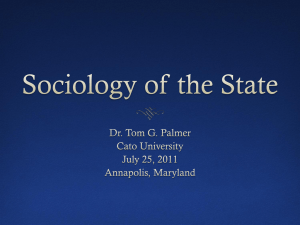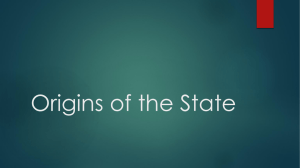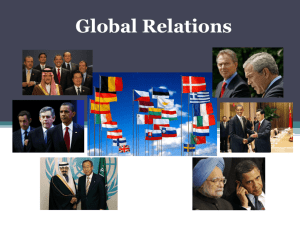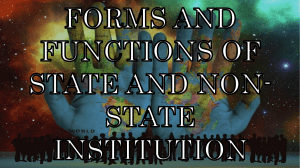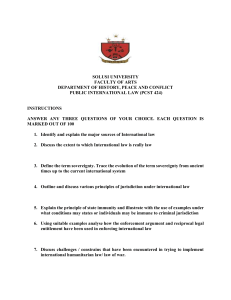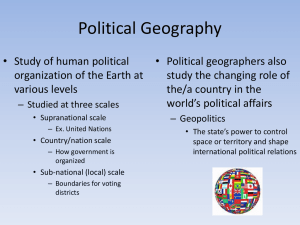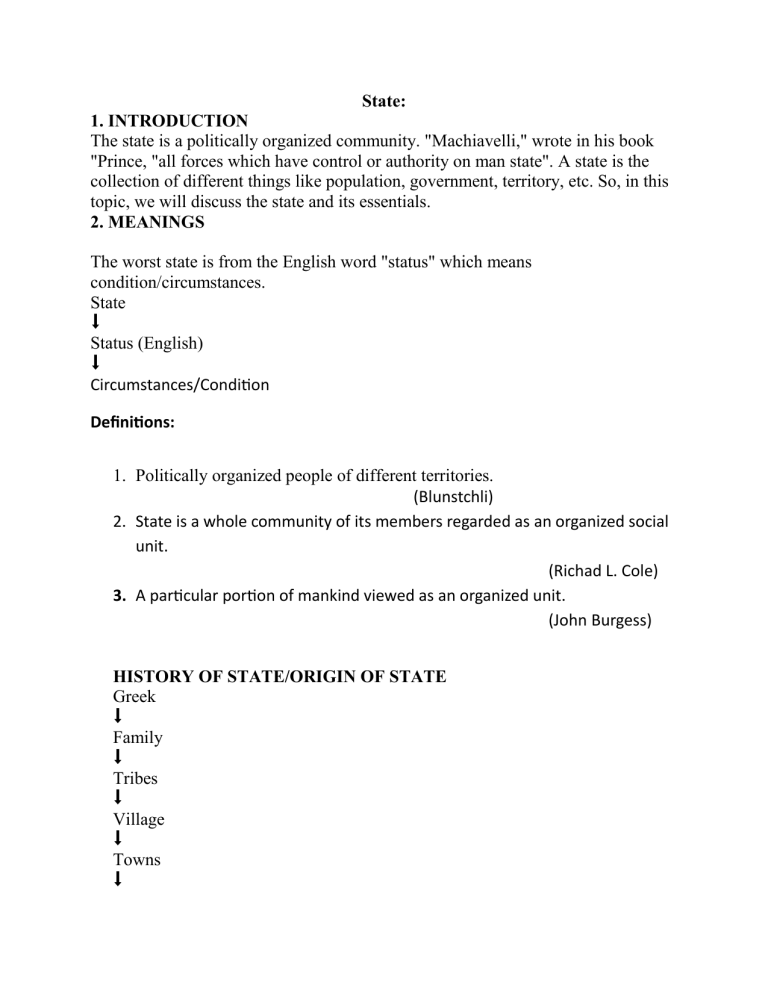
State: 1. INTRODUCTION The state is a politically organized community. "Machiavelli," wrote in his book "Prince, "all forces which have control or authority on man state". A state is the collection of different things like population, government, territory, etc. So, in this topic, we will discuss the state and its essentials. 2. MEANINGS The worst state is from the English word "status" which means condition/circumstances. State ⬇ Status (English) ⬇ Circumstances/Condition Definitions: 1. Politically organized people of different territories. (Blunstchli) 2. State is a whole community of its members regarded as an organized social unit. (Richad L. Cole) 3. A particular portion of mankind viewed as an organized unit. (John Burgess) HISTORY OF STATE/ORIGIN OF STATE Greek ⬇ Family ⬇ Tribes ⬇ Village ⬇ Towns ⬇ City ⬇ State 5. BASIC ELEMENTS • Sovereignty • Government • Population • Territory 6. SOVEREIGNTY The sovereignty is the most important and unique feature of the state. There is no state without sovereignty. The words Sovereignty are driven from the Latin word superneous which means supreme authority. However, it is the major feature of a state. It should be united, permanent, comprehensive, indivisible absolute and the most powerful authority of a state first stop there are two major aspects of sovereignty. • Internal sovereignty • External sovereignty 7. GOVERNMENT Government is the working agency of the state. It is also a major feature of the state. Besides sovereignty, there is a government that runs the state. The word government is driven by the Latin word "Gubernare" which means "rule" or "government". Government is a system or group of organized people to govern a state or community. Government is the governing agency of the state and consists of three main parts/bodies. • Legislative • Executive • Judiciary 8. POPULATION The whole number of people or inhabitants in a country or a region is called population. The world population is dried from the Latin word "populous" which means people. The state is a human institution. Hands population is the element. no state can be imagined without population. The population is a main and basic feature of a state. It is however difficult to fix the size of the population of a state. The modern state is usually very in population. Some states are overpopulated and some are population. 9. TERRITORY People cannot form a state unless they have a defined territory. The word territory is drived from the Latin word "territorium" which means State. The territory is land occupied by a population from a state. The territory is the material basis of the state. Land mountains rivers legs within its boundaries. Territorial water extending 6 miles into sea form cost. The other features of state: Unity: it means that the population and territory of the state are organized and united under a single supreme power Unity is an attribute not an element. Continuity or Permanence: It means that the state continues to exist for all the times Government changes but the state continues to exist The state is immortal, its laws and sovereignty are for all times Equality: It means that all states, whether big or small are equal in the eyes of international law. It is an attribute of an external sovereignty Islamic concept of state: 1. Nature of Islamic Polity: In Islam, there's no strict rule on how to run a government like in the West. Instead, the Quran and teachings of Prophet Muhammad give general guidelines for fair leadership. But they can be adapted to fit different times and places. This means Islamic states can be flexible in how they're governed. 2. Sovereignty of Allah: In Islam, Allah is the highest authority. The government's job is to follow Islamic law (Sharia) and promote a society based on Islamic values. This means the government serves God, not just one leader's wishes. 3. Caliphate: The Caliphate was an old system where one leader, called the Caliph, was seen as the successor to Prophet Muhammad (PBUH) in leading the Muslim world politically. Although the Caliphate doesn't exist anymore, some people think it should come back. But others believe that different types of governments can still follow Islamic ideas. 4. Government by Consultation (Shura): Leaders should talk with the people about important things. This doesn't mean they have to have a democracy like in the West, but it means they should let the public be involved in making decisions. Leaders should listen to what the community thinks before making choices. 5. Obedience of Ruler:h Muslims should follow fair leaders who rule based on Islamic teachings. But if a leader goes against Islamic law, Muslims might need to speak up or even stand against them. 5. Equality of all Mankind: In Islam, everyone is seen as equal in the eyes of God. This means that no matter your race, where you're from, or how much money you have, you should be treated fairly and justly by the law. 7. Payment of Zakat: Zakat is a must-do type of help given to people who don't have much. It's one of the important things in Islam called the Five Pillars. In a good Islamic society, there should be a way to collect and give out Zakat to those who really need it. But how these rules are followed can change based on history, culture, and different ways of thinking in Islam. CONCLUSION Consequently, we can say that a state is a political community having an organized population and government are defined territory and enjoys Independence from external threats. sovereignty government population and territory are the essentials of a state. Quotes The state is made for men not men for the state. (Einstein) A full successful state wishes happy poor. (M. Mangat)
